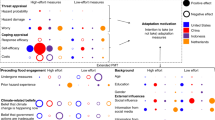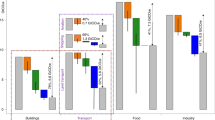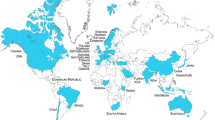Abstract
As climate change accelerates, governments will be forced to adapt to its impacts. The public could respond by increasing mitigation behaviours and support for decarbonization, creating a virtuous cycle between adaptation and mitigation. Alternatively, adaptation could generate backlash, undermining mitigation behaviours. Here we examine the relationship between adaptation and mitigation in the power sector, using the case of California’s public safety power shut-offs in 2019. We use a geographically targeted survey to compare residents living within power outage zones to matched residents in similar neighbourhoods who retained their electricity. Outage exposure increased respondent intentions to purchase fossil fuel generators while it may have reduced intentions to purchase electric vehicles. However, exposure did not change climate policy preferences, including willingness to pay for either wildfire or climate-mitigating reforms. Respondents blamed outages on their utility, not local, state or federal governments. Our findings demonstrate that energy infrastructure disruptions, even when not understood as climate adaptations, can still be consequential for decarbonization trajectories.
This is a preview of subscription content, access via your institution
Access options
Access Nature and 54 other Nature Portfolio journals
Get Nature+, our best-value online-access subscription
$29.99 / 30 days
cancel any time
Subscribe to this journal
Receive 12 digital issues and online access to articles
$119.00 per year
only $9.92 per issue
Buy this article
- Purchase on Springer Link
- Instant access to full article PDF
Prices may be subject to local taxes which are calculated during checkout







Similar content being viewed by others
Data availability
The underlying data used in this article has been deposited in a Harvard Dataverse repository to accompany publication of this article, available at https://doi.org/10.7910/DVN/UUYMNG.
Code availability
The code and replication scripts necessary to generate the figures, tables and analysis reported here have also been been deposited in the Harvard Dataverse repository at https://doi.org/10.7910/DVN/UUYMNG.
References
Reidmiller, D. R. et al. in Fourth National Climate Assessment. Vol. II: Impacts, Risks, and Adaptation in the United States (US Global Change Research Program, 2019).
Abatzoglou, J. T., Smith, C. M., Swain, D. L., Ptak, T. & Kolden, C. A. Population exposure to pre-emptive de-energization aimed at averting wildfires in Northern California. Environ. Res. Lett. 15, 094046 (2020).
Berrang-Ford, L. et al. A systematic global stocktake of evidence on human adaptation to climate change. Nat. Clim. Change 11, 989–1000 (2021).
Howe, P. D., Marlon, J. R., Mildenberger, M. & Shield, B. S. How will climate change shape climate opinion? Environ. Res. Lett. 14, 113001 (2019).
Egan, P. J. & Mullin, M. Turning personal experience into political attitudes: the effect of local weather on Americansʼ perceptions about global warming. J. Polit. 74, 796–809 (2012).
Zaval, L., Keenan, E. A., Johnson, E. J. & Weber, E. U. How warm days increase belief in global warming. Nat. Clim. Change 4, 143–147 (2014).
Bergquist, P. & Warshaw, C. Does global warming increase public concern about climate change? J. Polit. 81, 686–691 (2019).
Hamilton, L. C. et al. Wildfire, climate, and perceptions in northeast Oregon. Reg. Environ. Change 16, 1819–1832 (2016).
Hazlett, C. & Mildenberger, M. Wildfire exposure increases pro-environment voting within Democratic but not Republican areas. Am. Polit. Sci. Rev. 114, 1359–1365 (2020).
Shao, W. & Goidel, K. Seeing is believing? An examination of perceptions of local weather conditions and climate change among residents in the US Gulf Coast. Risk Anal. 36, 2136–2157 (2016).
Spence, A., Poortinga, W., Butler, C. & Pidgeon, NicholasFrank Perceptions of climate change and willingness to save energy related to flood experience. Nat. Clim. Change 1, 46–49 (2011).
Demski, C., Capstick, S., Pidgeon, N., Sposato, R. G. & Spence, A. Experience of extreme weather affects climate change mitigation and adaptation responses. Climatic Change 140, 149–164 (2017).
Albright, E. A. & Crow, D. Beliefs about climate change in the aftermath of extreme flooding. Climatic Change 155, 1–17 (2019).
Stokes, L. C. Electoral backlash against climate policy: a natural experiment on retrospective voting and local resistance to public policy. Am. J. Polit. Sci. 60, 958–974 (2016).
Carattini, S., Carvalho, M. & Fankhauser, S. Overcoming public resistance to carbon taxes. Wiley Interdiscip. Rev. Clim. Change 9, e531 (2018).
Mildenberger, M., Lachapelle, E., Harrison, K. & Stadelmann-Steffen, I. Limited impacts of carbon tax rebate programs on public support for carbon pricing. Nat. Clim. Change 12, 141–147 (2021).
Levy, M. A., Lubell, M. N. & McRoberts, N. The structure of mental models of sustainable agriculture. Nat. Sustain. 1, 413–420 (2018).
Gonzalez, P. et al. in Fourth National Climate Assessment. Vol. II: Impacts, Risks, and Adaptation in the United States Ch. 25 (US Global Change Research Program, 2018).
Ghanem, D. A., Mander, S. & Gough, C. I think we need to get a better generator: household resilience to disruption to power supply during storm events. Energy Policy 92, 171–180 (2016).
Rubin, G. J. & Rogers, M. B. Behavioural and psychological responses of the public during a major power outage: a literature review. Int. J. Disaster Risk Reduct. 38, 101226 (2019).
Spence, A., Leygue, C. & Andeane, P. O. Sustainability following adversity: power outage experiences are related to greater energy saving intentions in the United Kingdom and Mexico. Energy Res. Soc. Sci. 79, 102143 (2021).
Zanocco, C., Flora, J., Rajagopal, R. & Boudet, H. When the lights go out: Californiansʼ experience with wildfire-related public safety power shutoffs increases intention to adopt solar and storage. Energy Res. Soc. Sci. 79, 102183 (2021).
Wong-Parodi, G. When climate change adaptation becomes a looming threat to society: exploring views and responses to California wildfires and public safety power shutoffs. Energy Res. Soc. Sci. 70, 101757 (2020).
Amended PG&E Public Safety Power Shutoff (PSPS) Report to the CPUC, October 9–12, 2019 De-Energization Event (PG&E, 2019).
PG&E Public Safety Power Shutoff (PSPS) Report to the CPUC October 23–25, 2019 De-Energization Event (PG&E, 2019).
PG&E Public Safety Power Shutoff (PSPS) Report to the CPUC October 26 & 29, 2019 De-Energization Event (PG&E, 2019).
Lerman, A. E. & Trachtman, S. Where policies and politics diverge: awareness, assessments, and attribution in the ACA. Public Opin. Q. 84, 419–445 (2020).
Kahle, D. & Wickham, H. ggmap: spatial visualization with ggplot2. R. J. 5, 144–161 (2013).
Diamond, A. & Sekhon, J. Genetic matching for estimating causal effects: a general multivariate matching method for achieving balance in observational studies. Rev. Econ. Stat. 95, 932–945 (2013).
Keele, L. & Titiunik, R. Geographic boundaries as regression discontinuities. Polit. Anal. 23, 127–155 (2015).
Acknowledgements
This research was supported in part by funding from the Research Council of Norway as part of DEMOS grant 302869 (L.C.S.), the Swedish Formas Research Council grant 2019-01962 (L.C.S.), and the US National Science Foundation as part of both grant BCS-1753082 (P.D.H.) and grant CRISP-1541056 (M.L.). The funders had no role in study design, data collection and analysis, decision to publish or preparation of the manuscript. We also thank J. Marlon, P. Bergquist, A. Cooperman, S. Constantino and O.M. Lægreid for comments on earlier drafts of this manuscript.
Author information
Authors and Affiliations
Contributions
M.M. and P.D.H. jointly participated in all stages of this study, including design, data collection, analysis and writing. S.T. participated in analysis and writing. L.C.S. and M.L. participated in design, data collection and writing.
Corresponding author
Ethics declarations
Competing interests
The authors declare no competing interests.
Ethics statement
This study was reviewed and approved by the University of California Office of Research as Protocol 22-19-0808. Respondent participation in our survey was voluntary, and respondents provided informed consent before taking the survey.
Peer review
Peer review information
Nature Energy thanks Fedor Dokshin, Alexa Spence and the other, anonymous, reviewer(s) for their contribution to the peer review of this work.
Additional information
Publisher’s note Springer Nature remains neutral with regard to jurisdictional claims in published maps and institutional affiliations.
Supplementary information
Supplementary Information
Supplementary Notes 1–7.
Rights and permissions
About this article
Cite this article
Mildenberger, M., Howe, P.D., Trachtman, S. et al. The effect of public safety power shut-offs on climate change attitudes and behavioural intentions. Nat Energy 7, 736–743 (2022). https://doi.org/10.1038/s41560-022-01071-0
Received:
Accepted:
Published:
Issue Date:
DOI: https://doi.org/10.1038/s41560-022-01071-0
This article is cited by
-
Increasing multi-hazard climate risk and financial and health impacts on northern homeowners
Ambio (2024)
-
Assessment for the response and uncertainty of energy poverty to climate extremes in China
Environment, Development and Sustainability (2024)
-
Local and utility-wide cost allocations for a more equitable wildfire-resilient distribution grid
Nature Energy (2023)
-
Preparation of Co/CoOx Derived from a Low-temperature Etching of ZIF-67 for Oxygen Reduction and Oxygen Evolution Catalytic Reaction
Journal of Wuhan University of Technology-Mater. Sci. Ed. (2023)



